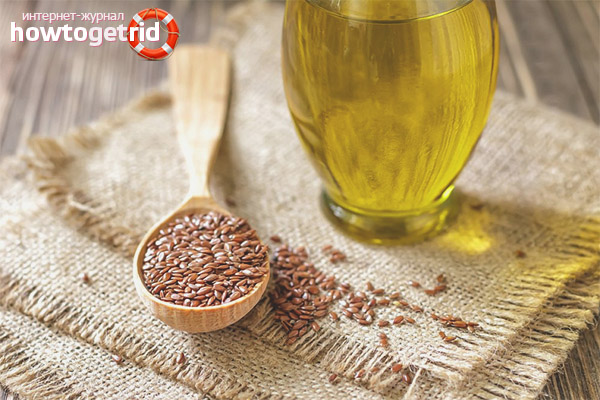The content of the article
Traditional medicine always comes to the aid of the expectant mother at a time when it is not recommended to use chemicals and synthetic additives. At the same time, we can find some of the useful ingredients in our buffet, for example, vegetable oils.
Flaxseed oil is considered one of the most beneficial due to its high content of omega fatty acids. It is actively involved in metabolism and strengthens all the internal systems of the pregnant woman, positively affects the growth and development of the embryo.
However, during pregnancy, it is necessary to use new products with caution and familiarize yourself with the side effects in advance.
Chemical composition
Organic flaxseed oil contains a significant amount of components, the effectiveness of which is proven in cooking, medicine and cosmetology:
- unsaturated omega fatty acids (linoleic, oleic, linolenic);
- saturated organic acids (myristic, stearic, palmitic);
- vitamins of groups B, A, E and K;
- phytosterols;
- lignans;
- macro- and microelements (phosphorus, calcium, zinc, potassium, magnesium and others);
- lecithin;
- linamarine;
- squalet;
- thioproline.
According to the content of linolenic acid (Omega-3), linseed oil is ahead of even the well-known fish oil supplement.
Calorie content of the product is very high - 884 kcal. In addition, it is more than 85% composed of fats, which should be taken into account when preparing a diet.
Saturated fatty acids are involved in the formation of beneficial cholesterol, without which the biochemical reactions of the body and metabolism are not complete.
Linolenic acid is involved in hemostasis and prevents increased thrombosis.
Useful properties of linseed oil during pregnancy
A valuable product comprehensively affects the body of a future mother and child, launches the most important biological processes, simulates immunity. Flaxseed oil is important for a pregnant woman for the following reasons.
- Reduces acidity. The tool envelops the mucous surface of the stomach and intestines, due to which it reduces the acidity of the medium, reduces the aggressive effect of sharp, salty and acidic products on the inner walls. Regular use of the drug allows you to get rid of heartburn, nausea, reduce the symptoms of gastritis and colitis, and prevent the appearance of ulcers and microcracks.
- Improves digestion. Enzymes and useful components in the oil improve the absorption of products, positively affect the motor function of the stomach and intestines. One spoonful of oil, eaten in the morning on an empty stomach, produces high-quality prevention of constipation in the later stages.
- Strengthens the cardiovascular system. Vitamins A and E increase the elasticity and elasticity of the vascular walls, prevent their fragility, and fatty acids cleanse of cholesterol and atherosclerotic plaques. Also, linseed oil stabilizes blood pressure, preventing the occurrence of hypertensive conditions (hypertension, eclampsia, etc.).
- Positive effect on the circulatory system. The product prevents the red blood cells from sticking together, which leads to thrombosis, varicose veins, embolism, thrombophlebitis and other unpleasant consequences of pregnancy.
- Strengthens the nervous system. Vitamins B, as well as magnesium in the composition of the product are involved in the formation of a healthy central nervous system and the fetal brain. For mom, these elements are valuable for other properties: eliminate mood swings, reduce the manifestations of depression and irritability, improve memory and concentration.
- Reduces the risk of pregnancy complications. Studies have shown that flax seed oil reduces the likelihood of fetoplacental insufficiency, fetal nervous system malformations, and intrauterine death.
- Stimulates the endocrine system. The product positively affects the thyroid and genital glands, improves the synthesis of hormones that support a normal pregnancy.
- Reduces plasma glucose. Regular consumption of oil prevents the development of diabetes or gestational diabetes.
- Fights pathogenic microflora. Vitamins and minerals strengthen the immune system, allowing it to resist viruses, infections, fungi, bacteria, etc. Also, linseed oil prevents parasites: giardia, roundworm, helminths and others.
- Improves liver function. The product cleanses the body, neutralizes the effects of toxins, toxins, metabolites, radionuclides and other harmful substances that are retained in the liver cells.
- Improves the health of the dermis. Vitamins of "beauty" and Omega acids are the key to smooth, supple and healthy skin. During the application of flaxseed oil, the manifestations of dermatitis (including allergic nature), irritability and dryness of the skin, its sensitivity are reduced. Local application of oil also increases the elasticity and tone of the epidermis, moisturizes it, preventing the occurrence of stretch marks.
- It fights against carcinogens and pathogenic cells. Scientists have discovered the ability of the drug to reduce the division of malignant cells. Flax seed oil reduces the risk of oncology, slows the growth of existing benign and malignant tumors.
- Facilitates the course of childbirth. Doctors have proven that the use of flax oil shortly before birth prepares the cervix for erection, improves its elasticity and allows you to quickly achieve the sizes necessary for labor.
How to apply linseed oil
Gynecologists advise women to use the product as a biological supplement, as well as in the role of a local cosmetic product. Flax oil is added to homemade shampoos and hair masks, rubbed into the nail plate and cuticle, enrich the cream and serum for the skin. To prevent stretch marks, they should rub vulnerable areas (skin of the chest and abdomen) twice a day.
Oil can be seasoned with salads and prepared meals, added to cooked fresh juices to improve the absorption of vitamins. But it’s better not to heat it, because in the process of roasting, carcinogens are released, and the oil itself gets an unpleasant bitter aftertaste.
To improve health, no more than 2 tablespoons of flaxseed oil are put per day. The best assimilation occurs if the product is eaten on an empty stomach immediately after waking up (30 minutes before breakfast). It is advisable to drink the product with natural juice or still water. The course of treatment is 30 days, after which it is necessary to take a break for at least 2 weeks. If you take the product in the form of capsules, then the dosage is the next - 2 pieces per day (morning and evening).
Where can I get a cure? Flaxseed oil is sold in large supermarkets in the department of vegetable oils, sauces and spices. It can also be ordered online from a trusted supplier who will provide all quality certificates for the products. Many mothers purchase oil in the pharmacy in the form of clogged glass bottles and capsules.
The negative effects of linseed oil
- An increase in the tone of the uterus and activation of its muscles, which increases the risk of premature birth.
- The first appearance of an allergic reaction to vegetable oils (rarely, but possible).
- Increased blood clotting, which leads to its thickening and the appearance of small blood clots.
- A significant decrease in blood pressure, which is undesirable for women hypotensive.
- The development of product intolerance to the gastrointestinal tract, which is manifested in the form of flatulence, bloating and prolonged diarrhea.
- Changes in hormonal levels (phytoestrogens in the composition of the oil may affect the secretion of other sex hormones).
As for the strict contraindications to the use of flaxseed oil, there are not so many of them:
- diseases of the gallbladder, thyroid and pancreas (e.g., pancreatitis, cholecystitis);
- the presence of urolithiasis or kidney stones;
- hormonal disorders;
- irritated intestines (frequent diarrhea);
- individual intolerance (allergy);
- tone or hypertonicity of the uterus;
- complications or pathologies of pregnancy.
Flaxseed oil rarely appears on store shelves and is in good demand due to its beneficial properties. Moderate use of the product improves the general condition, mood, and also facilitates childbirth.
Video: the benefits and harms of linseed oil











Submit